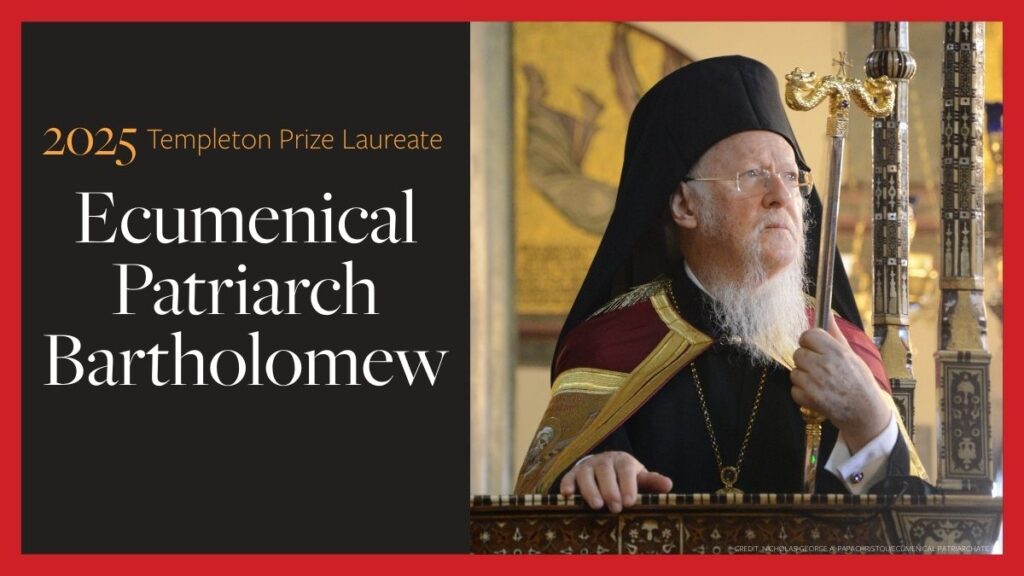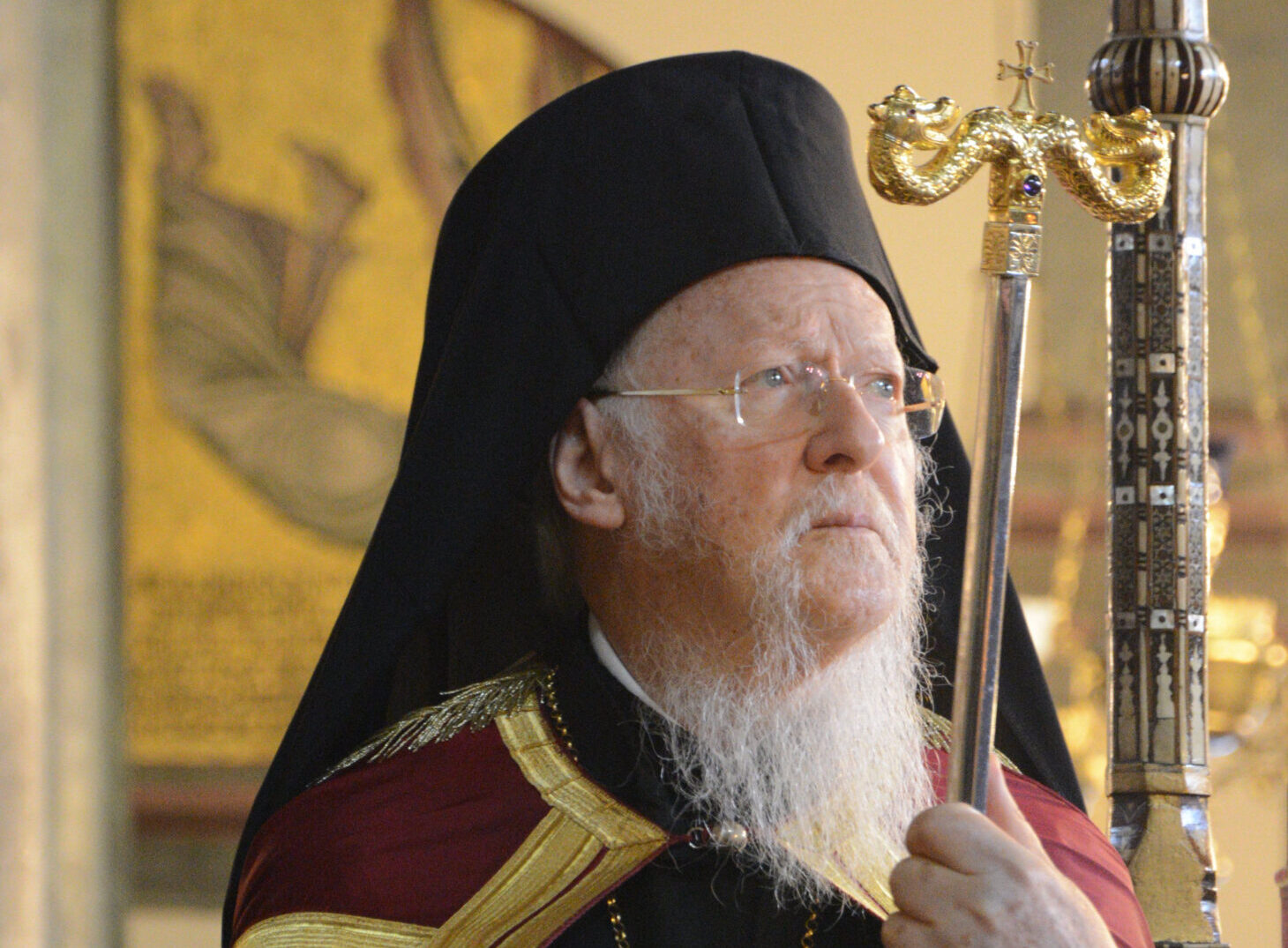Cited for Leadership in Diagnosing the Environmental Crisis as a Spiritual Calling

He Joins Past Laureates Desmond Tutu and Jane Goodall to Receive One of the World’s Largest Individual Lifetime Achievement Awards
Ecumenical Patriarch Bartholomew, the spiritual leader of 300 million Eastern Orthodox Christians, has been awarded the 2025 Templeton Prize for his pioneering efforts to bridge scientific and spiritual understandings of humanity’s relationship with the natural world, bringing together people of different faiths to heed a call for stewardship of creation.
For over 30 years, Bartholomew has articulated a compelling moral and theological vision of humanity’s responsibility to care for the Earth and to uphold harmony, unity, and mutual love within and across religious communities. He has consistently exhorted people of faith to view their relationship to creation as a sacred duty, arguing that making a false historical divide between the material and spiritual can deny the significance of environmental degradation.
“Bartholomew is receiving the Templeton Prize for making care for the environment a central commitment in his role as a spiritual leader,” said Heather Templeton Dill, President of the John Templeton Foundation. “This is harnessing the power of the sciences to expand our collective understanding of humankind’s place and purpose in the world.
“Bartholomew has also deepened Christians’ ideas of what it means to be faithful in the world today. It involves caring for all aspects of God’s creation including the people around us and the natural world in which we live.”
In pursuing this goal, Bartholomew used the stature of his office—the highest spiritual authority within the Eastern Orthodox Church—to convene groups of scientists, scholars, political leaders, and clerics from the Catholic, Jewish, and Muslim worlds. Recognizing that science plays a critical role in helping religious leaders accept their responsibility to be good stewards of the Earth, Bartholomew described an “ecumenical imperative.” Care for creation, he argued, is a moral duty that transcends conventional divides between religious, secular, and sectarian perspectives. To that end, he has worked with other leaders to elevate environmental concerns as a means to care for the most vulnerable members of our societies.
“We are not owners of this planet,” said Bartholomew in an interview for the Templeton Prize. “It belongs to the coming generations as well. We are simply stewards and priests of the environment and not proprietors of it.
“Ecology is not a political or economic issue. It is mainly a spiritual and religious issue because God created and gave it to us to protect it, to cultivate it, to use it, but not to abuse it. This is the spiritual dimension of ecology,” he observed.
“I see that we have a common ideal, a common purpose. Maybe our methods are diverse, but the final goal of all of us is to save our planet, to create better conditions of life for the inhabitants of this planet, which is our common home, our ecos. This is a Greek word, which means ‘home,’ and ecology is the science about our home. We complete each other, scientists and media and local administrators and theologians and priests and bishops—we complete each other in order to serve this common ideal.”
“I am delighted to learn that the Templeton Prize is being awarded to His All-Holiness Bartholomew,” said Jane Goodall, PhD, DBE, Founder of the Jane Goodall Institute, UN Messenger of Peace, and the 2021 Templeton Prize winner.
“I have had the privilege of spending time with His All-Holiness and cannot think of a more deserving candidate for this honour. His endeavours in bringing these disparate groups together in order to emphasize the importance of protecting the natural world on which our future depends are truly making a difference.”
A Spiritual Vision for Environmental Stewardship
Born in 1940 on the island of Imbros, Bartholomew, 85, was ordained to the Orthodox priesthood in 1969. He later served as Metropolitan of Philadelphia and then Chalcedon and was elected 270th Ecumenical Patriarch 1991. Regarded as the primus inter pares among the heads of the independent churches that compose the Eastern Orthodox Church, he is broadly recognized as the spiritual leader of Eastern Orthodox Christians around the world.
Upon becoming Ecumenical Patriarch in 1991, Bartholomew made care for the Earth a focal point of his tenure, spurring a movement of spiritually informed environmentalism. His leadership has shaped global discussions on climate change, biodiversity, and ecological justice by framing them within the moral language of faith. He has encouraged Orthodox Christians to recognize environmental destruction as a sin against nature, advocating that the church must be seriously involved in the care of creation.
Just a month after his election as Patriarch, Bartholomew took the first step to confront environmental issues by organizing an event in Crete, at which time he forged a bond with the World Wildlife Fund and fellow environmentalist Prince Philip, the late Duke of Edinburgh and longtime patron of the Templeton Prize. One month later, he convened all Orthodox Primates to discuss the environment and urged them to speak to their congregations about the issue.
In 1997, he made history by declaring that acts harming the environment—such as pollution, deforestation, and climate change—are not just practical missteps but moral failings. This pastoral teaching introduced a new category of sin—“ecological sin”—which has since influenced both religious and secular discourse on environmental ethics. His ideas were prominently cited in Pope Francis’ 2015 encyclical Laudato Si’, underscoring his broad influence beyond the Orthodox world.
Bartholomew also created Religion, Science, and the Environment, an NGO that hosted eight symposia between 1995 and 2009 in collaboration with the European Commission and the United Nations. Each symposium brought together scientists and people of religious faith to reflect on the Earth’s waters. He convened a series of five “Halki Summits” between 2012 and 2022, this time gathering scientists, journalists, activists, theologians, and academics from around the world. The summits were guided by the principle that lasting protection of the environment is not possible without a fundamental change in values.
“Science alone cannot save the planet,” Bartholomew said in 2015. “Science will inform us about the world, but it cannot reach the depths of our soul and mind.”
In Bartholomew’s view, “choosing life” for the planet requires ethical and spiritual change. The way religious people view the planet affects how they relate to it; if they fail to see it as God’s creation and sacred or worthy of veneration, then they will exert less care in preserving the land and resources of our world. For Bartholomew, the root cause of environmental loss is greed: a disordered desire that leads us to mistreat our common home. Even at the level of the individual, he argues that there should be moral, social, and legal consequences when a person harms God’s creation.
What the world needs, Bartholomew believes, is metanoia, or repentant conversion from a self-centered, materialistic lifestyle. For Bartholomew, responding to the “cry of the Earth” happens not only with policies that attend to scientific evidence but also with individual conversion.
Bartholomew has collaborated with religious leaders of other faiths in advocating for environmental change and highlighting the spiritual and ethical roots of the problem. In 2021, Bartholomew, Pope Francis, and the Archbishop of Canterbury, Justin Welby, issued their first joint message for the protection of creation. They called for prayer and sacrifice for the sake of the planet, a landmark statement that challenged global leaders to treat climate change and biodiversity loss as pressing ethical concerns.
Bartholomew’s environmental efforts at the crossroads of science and religion have been widely recognized. He received the Congressional Gold Medal (USA) in 1997, the Sophie Prize (Norway) in 2002, the UN Environmental Programme’s Champions of the Earth Award in 2004; he was named one of Time’s 100 Most Influential People in the World in 2008, and he won the Human Dignity Award from the American Jewish Committee in 2021, among many other awards. He has received several honorary doctorates from academic institutions around the world, including the University of Notre Dame (2021), and he has addressed many international groups, including the World Economic Forum and the European Parliament. In 2023, a volume of eleven joint statements from Bartholomew on topics ranging from climate change to ecumenical dialogue was published by the University of Notre Dame Press.
Bartholomew joins a list of 54 Prize recipients including St. Teresa of Kolkata (the inaugural award in 1973) and the Dalai Lama (2012). The 2024 Templeton Prize was awarded to psychologist and scholar Dr. Pumla Gobodo-Madikizela. Preceding her was nurse-midwife and healthcare advocate Edna Adan Ismail (2023), theoretical physicist Dr. Frank Wilczek (2022), and ethologist and conservationist Dr. Jane Goodall (2021). Other religious leaders who have won the Prize include Rabbi Lord Jonathan Sacks (2016) and Archbishop Desmond Tutu (2013).
###
Notes to Editors
- More information on Bartholomew, his statement on accepting the Prize, a statement by Heather Templeton Dill on the awarding of the Prize, and information on the 54 previous Templeton Prize Laureates, are available at www.templetonprize.org/2025
- Follow the Templeton Prize on X using @TempletonPrize and #TempletonPrize2025.
- Follow the Templeton Prize on X, Facebook, and Instagram using #TempletonPrize2025
- Watch and embed a video featuring Bartholomew on the Templeton Prize YouTube channel, where you will find additional videos with information on the Templeton Prize.
About the Templeton Prize
Established in 1972, the Templeton Prize is one of the world’s largest annual individual awards. It is given to honor individuals whose exemplary achievements advance Sir John Templeton’s philanthropic vision: harnessing the power of the sciences to explore the deepest questions of the universe and humankind’s place and purpose within it. Currently valued at £1.1 million GBP, the award is adjusted periodically so it always exceeds the value of the Nobel Prize. Winners have come from a wide range of faiths, fields, and geographies, and have included Nobel Prize winners, philosophers, theoretical physicists, and one canonized saint. The Templeton Prize is awarded by the three Templeton philanthropies: the John Templeton Foundation, based in West Conshohocken, Pennsylvania, and by the Templeton World Charity Foundation and Templeton Religion Trust, based in Nassau, The Bahamas. To learn more, visit TempletonPrize.org
